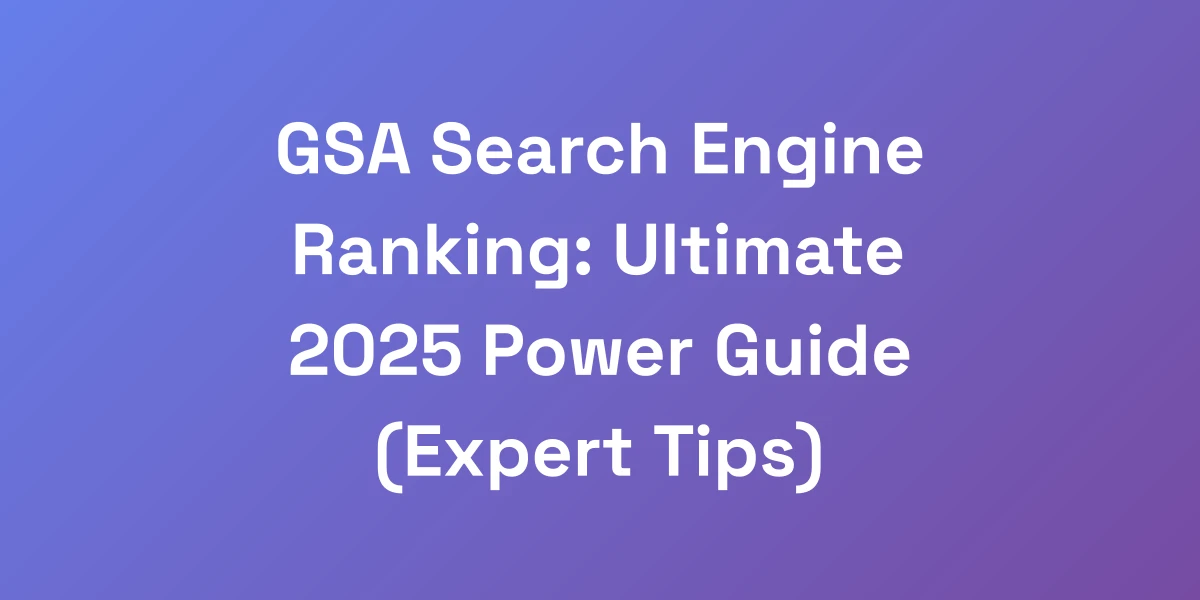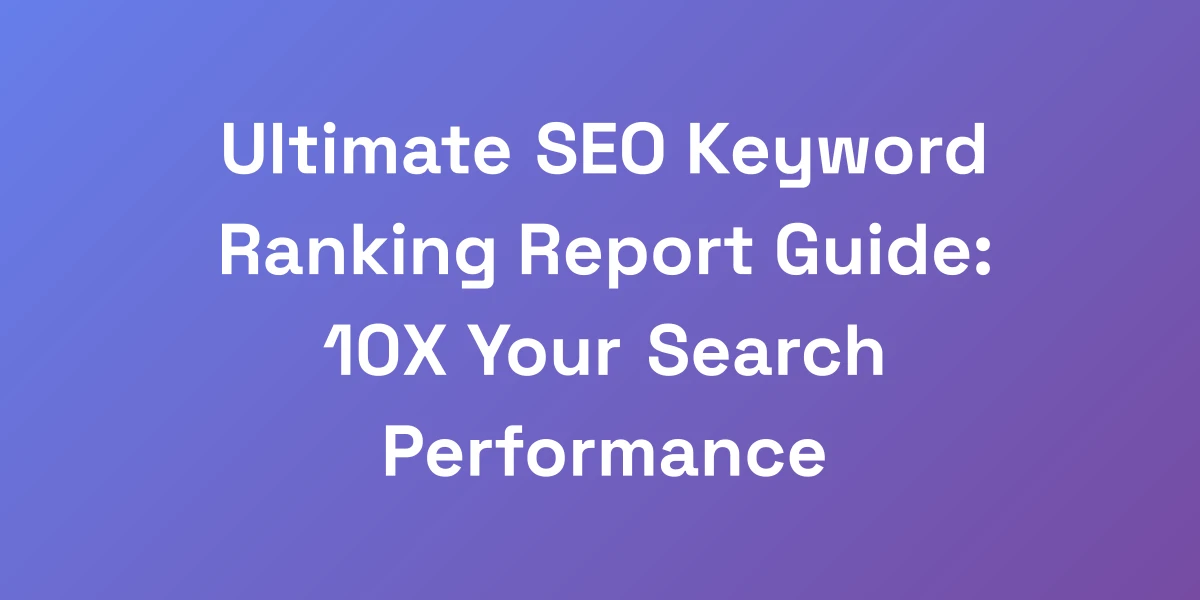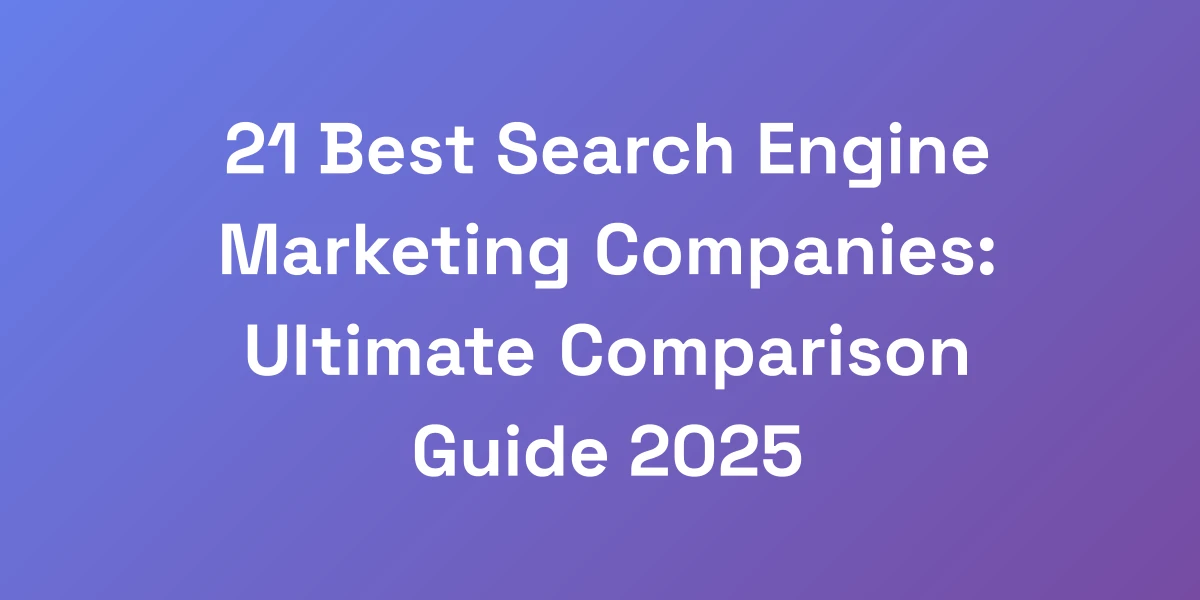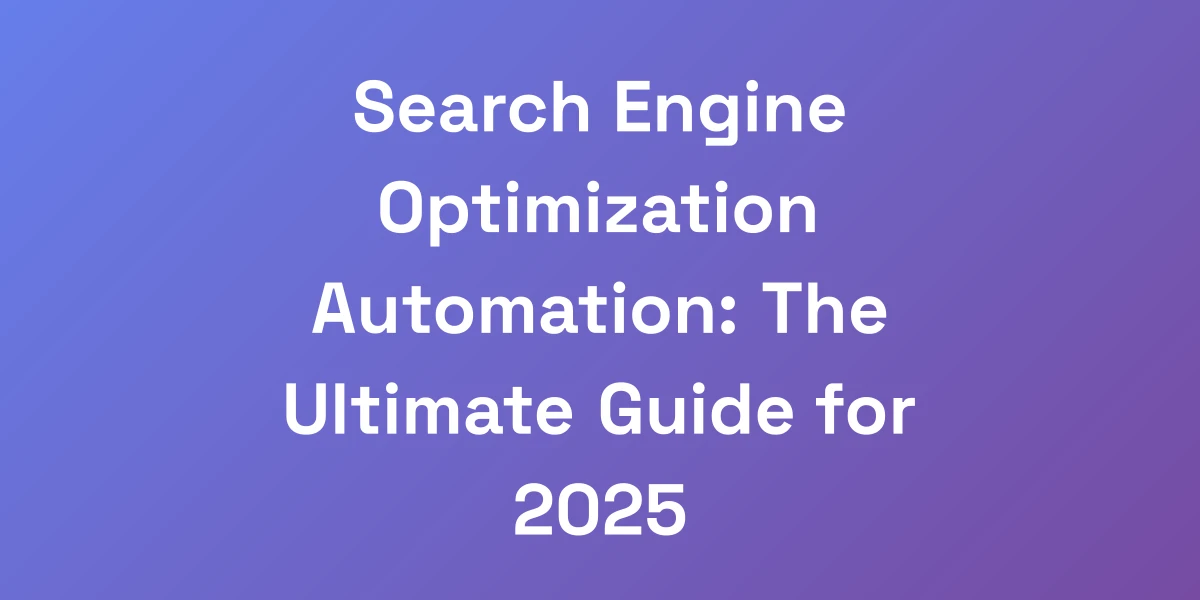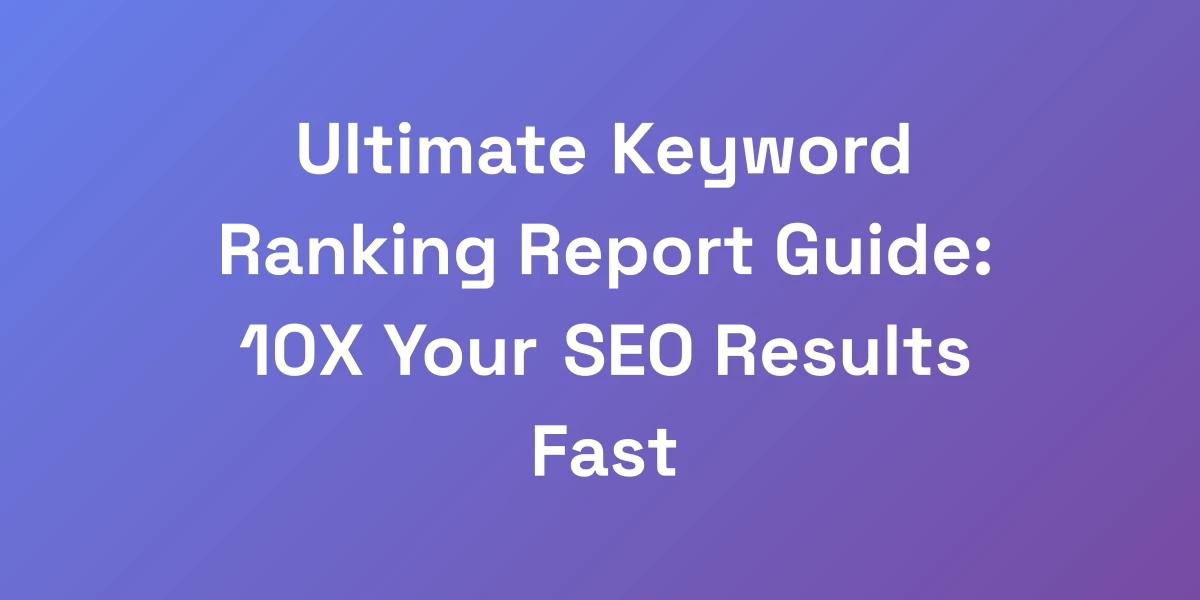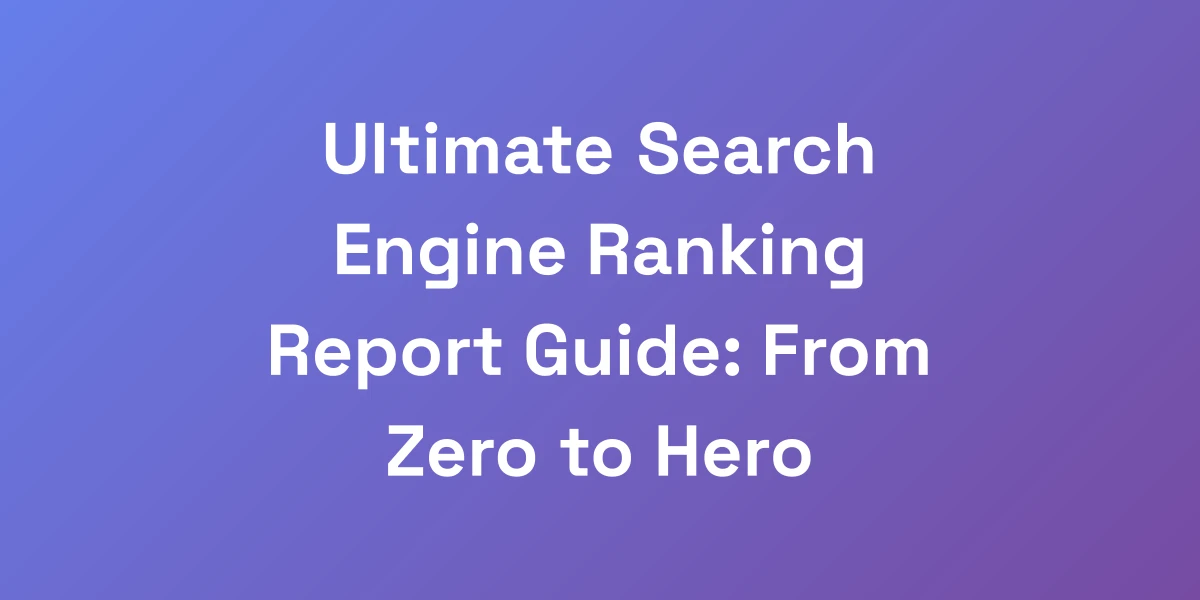
Ultimate Search Engine Ranking Report Guide: From Zero to Hero
Mar 14, 2025 | By [email protected]
Ultimate Search Engine Ranking Report Guide: From Zero to Hero
Let’s get straight to the point—most of you are bombarded with search engine ranking reports that do nothing but clutter your inbox. Why? Because 90% of businesses are getting it all wrong.
You’re throwing money away chasing metrics that look good on paper but don’t translate to real-world results. Imagine burning through $50K+ in agency fees only to find out those ranking positions mean zilch for your bottom line.
But here’s the kicker: a proper ranking report isn’t just about tracking positions; it’s about tracking money in your pocket. In this guide, we’re diving deep to show you how to create reports that actually drive revenue. Ready to turn your SEO game from zero to hero?
Why Most Search Engine Ranking Reports Fail (And What That’s Costing You)
Let’s face it, the majority of search engine ranking reports fail miserably because they focus on the wrong things. Instead of providing actionable insights, they drown you in vanity metrics that look impressive but offer no real value.
Think about it—how much have you invested in SEO only to see minimal returns? It’s time we break down why this happens and how you can avoid these costly pitfalls.
The Hidden Cost of Poor Ranking Reports
Poor ranking reports aren’t just ineffective; they’re downright expensive. When your reports fail to provide clear, actionable data, you’re left guessing where your SEO strategy is falling short.
- Financial Losses: Companies can lose thousands of dollars annually due to ineffective SEO strategies driven by poor reporting.
- Resource Drain: Wasting time and effort on strategies that don’t work takes away valuable resources that could be used more effectively elsewhere.
Common Mistakes That Drain Your SEO Budget
Many businesses make these critical mistakes when creating SEO reports:
- Overemphasis on Rankings: Focusing solely on keyword positions without considering the quality of traffic and conversions.
- Ignoring User Intent: Not aligning your SEO efforts with what your audience is actually searching for.
- Lack of Customization: Using generic reporting templates that don’t address your specific business goals.
Why Traditional Ranking Reports Don’t Tell the Full Story
Traditional ranking reports only scratch the surface. They show where you stand but don’t explain why you’re there or how to get to where you want to be.
- Surface-Level Insights: Basic ranking positions don’t provide context or deeper understanding of performance.
- Missing Revenue Correlation: Without linking rankings to revenue, you can’t see the true impact of your SEO efforts.
The Revenue Impact of Accurate Position Tracking
Accurate position tracking can transform your SEO strategy from a guessing game to a money-making machine.
- Better ROI: By focusing on metrics that drive revenue, you ensure every dollar spent on SEO is working hard for you.
- Informed Decisions: Accurate data allows you to pivot strategies quickly, maximizing your growth potential.
Real Examples of Ranking Report Failures
Consider this scenario: An e-commerce site spent $100K on SEO, relying on a basic ranking report that showed fluctuating positions. However, their sales remained flat because the report didn’t track revenue impact. They were left with high costs and no real growth.
These failures highlight the importance of comprehensive ranking reports that go beyond mere positions and focus on financial outcomes.
The Anatomy of a Revenue-Generating Ranking Report
Stop viewing your ranking reports as mere scoreboards. Instead, see them as a money-making blueprint. The difference between a basic report and one that prints money lies in the details.
We’re breaking down the essential components that turn ranking reports into profit centers. These elements are not theoretical—they’re proven strategies that have generated millions in revenue for our clients.
Essential Components of High-Converting Reports
A high-converting ranking report should include the following components:
- Target Keywords: Focus on keywords that have high commercial intent and relevance to your business.
- Traffic Metrics: Track organic traffic growth associated with your target keywords.
- Conversion Rates: Measure how traffic from different positions translates into conversions.
- Revenue Attribution: Link keyword rankings to actual revenue generated.
Key Metrics That Actually Matter for Revenue
Not all metrics are created equal. Here are the ones that directly impact your revenue:
- Click-Through Rate (CTR): Higher rankings generally lead to higher CTRs, which can boost traffic and conversions.
- Conversion Rate: Track how well your traffic converts into sales or leads.
- Revenue Per Click (RPC): Calculate the revenue generated for each click from your target keywords.
- Engagement Metrics: Metrics like bounce rate and time on site can indicate the quality of your traffic.
Setting Up Custom Report Templates
Generic templates won’t cut it. You need custom report templates tailored to your specific business goals.
- Identify Key Objectives: What are your primary goals? Increased sales, lead generation, brand awareness?
- Customize Metrics: Include only the metrics that align with your objectives.
- Automate Reporting: Use tools that allow you to create and schedule custom reports easily.
Tracking Commercial Intent Keywords
Not all keywords are created equal. Focus on those with commercial intent that are more likely to convert.
- Identify High-Intent Keywords: Use tools to find keywords that signal purchase intent.
- Segment by Intent: Categorize keywords based on their intent—informational, navigational, transactional.
- Prioritize High-Intent Keywords: Allocate more resources to keywords that drive conversions.
Advanced Filtering and Segmentation Strategies
To make your reports actionable, apply advanced filtering and segmentation techniques.
- Filter by Performance: Focus on keywords that are driving the most traffic and conversions.
- Segment by Funnel Stage: Differentiate keywords based on where they fall in the sales funnel.
- Use Comparative Analysis: Compare performance across different periods or segments to identify trends.
Tools and Technologies That Actually Move the Needle
Let’s cut through the noise. You don’t need a dozen tools to get effective ranking reports. Here’s the stack that actually works—proven to save you money and drive results.
Top 3 Essential Ranking Tools Worth Your Money
These tools offer the best bang for your buck:
- Ahrefs: Excellent for backlink analysis and competitor research.
- Semrush: Comprehensive tool for keyword research, site audits, and more.
- auto SEO tools: Utilize these for efficient on-page optimization and link tracking.
Setting Up Automated Reporting Systems
Automation is your friend. Set up systems that automatically generate and distribute reports, freeing up your time for strategic thinking.
- APIs: Integrate your tools with APIs to pull data seamlessly.
- Scheduled Reports: Set up daily, weekly, or monthly reports to stay on top of your SEO performance.
- Real-Time Dashboards: Utilize dashboards that update in real-time for instant insights.
Integration Strategies for Maximum Efficiency
Efficiency is key when managing multiple tools. Here’s how to integrate them for optimal performance:
- Unified Data Sources: Ensure all your tools pull data from a common source to maintain consistency.
- Seamless API Integrations: Connect your tools using APIs to streamline data flow and reduce manual work.
- Centralized Dashboards: Use platforms that can aggregate data from multiple tools into a single dashboard.
Cost-Effective Alternatives to Premium Tools
Don’t break the bank. Here are some cost-effective alternatives that deliver great results:
- Ubersuggest: Affordable option for keyword research and backlinks.
- Serpstat: Comprehensive tool for SEO and PPC analysis at a lower price point.
- Moz Free Tools: Utilize Moz’s free tools for on-page optimization and link tracking.
Custom API Solutions for Scale
For businesses ready to scale, custom API solutions can provide the flexibility and power you need.
- Tailored Integrations: Develop custom integrations to fit your specific needs.
- Scalability: Ensure your API solutions can grow with your business.
- Enhanced Data Processing: Handle large volumes of data efficiently with custom API setups.
Turning Ranking Data Into Actionable Growth Strategies
Here’s where the rubber meets the road. Raw ranking data is useless without a framework for turning it into revenue.
We’re sharing the exact process to transform ranking reports into growth strategies that print money. This isn’t about minor tweaks—it’s about making fundamental shifts in your SEO approach.
Creating Action Plans from Report Insights
Transform insights into action with a clear, strategic plan:
- Identify Key Opportunities: Look for keywords showing potential for growth and prioritize them.
- Set Clear Goals: Define what success looks like for each keyword or segment.
- Develop Targeted Strategies: Create specific strategies to improve rankings and conversions for each targeted keyword.
Identifying Quick-Win Opportunities
Not all opportunities require extensive resources. Focus on quick wins to boost your rankings and revenue quickly:
- Optimize Low-Hanging Fruits: Identify keywords that are close to higher rankings and focus your efforts there.
- Improve On-Page SEO: Update meta tags, improve content quality, and fix technical issues to quickly climb rankings.
- Leverage Existing Content: Repurpose and autoblogging existing content to capture more traffic.
Competitive Gap Analysis Framework
Understand where your competitors are excelling and how you can outperform them. Here’s how:
- Analyze Competitor Rankings: Identify where your competitors are winning and why.
- Benchmark Performance: Compare your metrics against competitors to find gaps and opportunities.
- Strategize Improvements: Develop strategies to close gaps and surpass competitors in key areas.
ROI Forecasting and Projection Models
Predict the financial impact of your SEO efforts with accurate forecasting:
- Historical Data Analysis: Use past performance data to predict future outcomes.
- Scenario Planning: Create different scenarios based on potential changes in SEO strategy.
- Revenue Projections: Link your SEO metrics to projected revenue to understand potential ROI.
Implementation Timeline and Priorities
Plan your SEO strategy with a clear timeline and set priorities to ensure timely execution:
- Phase Your Initiatives: Break down your strategy into manageable phases.
- Set Deadlines: Assign deadlines to each task to maintain momentum.
- Prioritize High-Impact Tasks: Focus on tasks that will yield the highest returns first.
Scaling Your Ranking Report Strategy
Most businesses hit a ceiling with their ranking reports because they don’t know how to scale. Whether you’re managing one site or one hundred, the principles remain the same—but the execution changes dramatically.
Here’s how to build a marketing automation for agencies that grows with your business without requiring proportionally more resources.
Automated Reporting Workflows
Automation is key to scaling your SEO efforts efficiently:
- Use Automation Tools: Implement tools that can SEO optimization automation.
- Streamline Processes: Create workflows that reduce manual intervention and increase efficiency.
- Ensure Consistency: Automated workflows ensure that reports are consistent and accurate across all sites.
Team Training and Documentation
A scalable system requires a well-trained team and thorough documentation:
- Provide Comprehensive Training: Ensure your team understands the tools and processes in place.
- Create Detailed Documentation: Document all procedures and standards to maintain consistency.
- Foster a Culture of Continuous Learning: Encourage team members to stay updated with the latest SEO trends and tools.
Quality Control and Verification Systems
Maintaining quality as you scale is crucial. Implement robust quality control measures:
- Regular Audits: Conduct periodic audits of your ranking reports to ensure accuracy and relevance.
- Implement Verification Processes: Set up processes to verify data accuracy before it’s reported.
- Feedback Loops: Create feedback mechanisms to continuously improve the quality of your reports.
Managing Multiple Sites and Markets
Expanding to multiple sites or markets requires strategic management:
- Segment Your Reports: Create separate reports for each site or market to ensure clarity.
- Customize Strategies: Tailor your SEO strategies to the specific needs of each market.
- Use Centralized Tools: Implement tools that can manage multiple sites from a single dashboard.
Future-Proofing Your Reporting Strategy
Stay ahead of the game by future-proofing your ranking report strategy:
- Stay Updated with SEO trends: Continuously monitor and adapt to changes in SEO best practices.
- Invest in Scalable Technologies: Use technologies that can easily scale as your business grows.
- Plan for Evolution: Ensure your reporting strategy can evolve with your business needs and market changes.
Conclusion
We’ve walked you through the common pitfalls of search engine ranking reports and how they can drain your budget. But more importantly, we’ve shown you how to transform these reports into powerful tools that drive revenue.
By focusing on the right metrics, utilizing the right tools, and implementing scalable strategies, you can turn your SEO efforts from a cost center into a profit generator.
Ready to take your search engine ranking reports from zero to hero? Start implementing these strategies today and watch your SEO performance—and your bottom line—soar. Don’t just track your rankings; track your revenue and make every SEO dollar count.
What’s your biggest SEO challenge right now? Let us know in the comments below and let’s tackle it together!
